
Official Edgar Rice Burroughs Tribute and Weekly Webzine Site
Since 1996 ~ Over 10,000 Web Pages in Archive
Presents
Volume 5029

Official Edgar Rice Burroughs Tribute and Weekly Webzine Site
Since 1996 ~ Over 10,000 Web Pages in Archive
Presents
Volume 5029
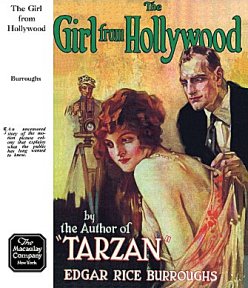
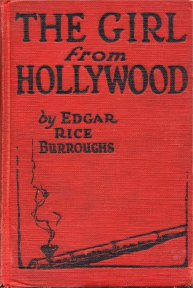
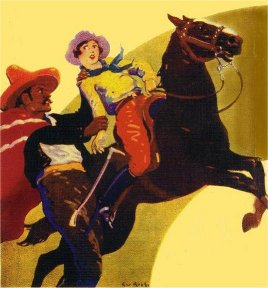
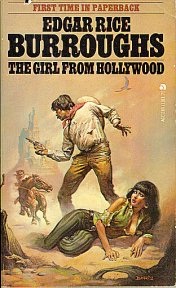
“Her mind is Tiffany twisted, she got the Mercedes bends
She got a lot of pretty, pretty boys she calls friends
How they dance in the courtyard, sweet summer sweat.
Some dance to remember, some dance to forget.”
– The Eagles, “Hotel California”We are just in the beginning of the middle of ERB's story. I have no idea if he was structuring the novel with a certain amount of pages for the beinning, a certain amount for the middle, and a certain amount for the end, but I believe the main themes have been introduced with just enough clues to keep the story moving forward.
I don’t know if the drugs have addled Shannon’s judgment, but she is about to do some really stupid things, showing what a novice she is in the criminal underworld. ERB knew the power of the federal government and doesn’t hesitate to paint them as both good and evil. He also demonstrates how easy it is for criminals to double-cross each other for profit, amusement, or petty revenge. It always amazes me that most criminals are really stupid and actually help the police catch them with their follies. But it also amazes me how many murders each year go by unsolved. Some people are smart enough to keep getting away with it. All right, back to the story.
CHAPTER FIFTEEN
During the hour following breakfast that morning, while Shannon was alone in her rooms, the craving returned. The thought of it turned her sick when she felt it coming. She had been occupying herself making her bed and tidying the room, as she had done each morning since her arrival; but when that was done, her thoughts reverted by habit to the desire that had so fatally mastered her.ERB was a health nut, and had strong views about what really constituted physical beauty. He loved the outdoors. So we must forgive him for another of his rare religious outbursts.
There crept into her mind a thought that had found its way there more than once during the past two years – the thought of self-destruction. She put it away from her; but in the depth of her soul she knew that never before had it taken so strong a hold upon her. Her mother, her only tie, was gone, and no one would care. She had looked into heaven and found that it was not for her. She had no future except to return to the hideous existence of the Hollywood bungalow and her lonely boarding house, and to the hated Crumb.
It was then that Eva Pennington called her.
She was descending the stairs toward Eva, who stood at the foot, holding open the door that led into the patio. She welcomed the interruption that had broken in upon her morbid thoughts. The sight of the winsome figure smiling up at her dispelled them as the light of the sun sweeps away miasmatic vapors.
They walked down the hill, past the saddle horse barn, and along the gravelled road that led to the upper end of the ranch. The summer sun beat hotly upon them, making each old sycamore and oak and walnut a delightful oasis of refreshing shade. In a field at the their left two mowers were clicking merrily through lush alfalfa. At their right, beyond the pasture fence, gentle Guernseys lay in the shade of a wide-spreading sycamore, a part of the pastoral allegory of content that was the Rancho del Ganado; and over all the blue California sky and the glorious sun.
They swung up then through the orange grove, and along the upper road back toward the house. It was noon and lunch time when they arrived. Shannon was hot and tired and dusty and delighted as she opened the door at the foot of the stairs that led to her rooms above.
Then she paused. The old, gripping desire had seized her. She had not once felt it since she had passed through that door more than two hours before.
For a moment she hesitated, and then, fearfully, she turned toward Eva.
“May I clean up in your room?” she asked.
There was a strange note of appeal in Shannon’s voice that the other girl did not understand.
“Why, certainly,” she said; “but is there anything the matter? You are not ill?”
“Just a little tired.”
“There! I should never have walked you so far. I’m so sorry!”
“I want to be tired. I want to do it again this afternoon – all afternoon. I don’t want to stop until I am ready to drop!” Then, seeing the surprise in Eva’s expression, she added: “You see, I shall be here such a short time that I want to crowd every single moment full of pleasant memories.”
Shannon thought that she had never eaten so much before as she had that morning at breakfast; but at luncheon she more than duplicated her past performance.
“My!” Shannon exclaimed at last. “I have seen the pigs and I have become one.”
“And I see something, dear,” said Mrs. Pennington, smiling.
“What?”
“Some color in your cheeks.”
“Not really..?” she cried, delighted.
“Yes, really.”
“And it’s mighty becoming,” offered the Colonel. “Nothing like a brown skin and rosy cheeks for beauty. That’s the way God meant girls to be, or He wouldn’t have given ‘em delicate skins and hung the sun up there to beautify ‘em.”
“What a dapper little thought!” exclaimed Eva. “Popsy should have been a poet.”
“Or an ad writer for a cosmetic manufacturer,” suggested Custer.I don’t know if ERB was ever addicted to anything, but I was: cigarettes. I began smoking in high school, at first just on weekends, when I would go out drinking with friends. I was up to over two packs a day, and rolling my own, before I quit in the late summer of 1970. I tried to quit three or four times during the seven years I smoked, but I always failed when I would have a couple of drinks, enough to dissolve my will power. And before I succeeded, I recall vividly the mental and physical hell I would endure when I ran out. Once, when I was living in Toronto in the winter and spring of 1970, I was broke and the couple I was staying with didn’t smoke cigarettes. Roy, the husband, smoked a pipe. Kay, the wife, occasionally would smoke one of my cigarettes during our many after dinner conversations.
Roy was an accountant from Edmonton, Alberta, and worked downtown in a fifty story office building. Kay, also from Edmonton, was a school teacher. I was AWOL from the U.S. Army, living on their charity. I tried rolling Roy’s pipe tobacco in a cigarette paper and it was so horrible that I just couldn’t hack it. I tried to read a book – they had a great library – to sidetrack my mind, but it kept saying, relentlessly, you need a cigarette, you need another cigarette. I tried watching TV, but that didn’t work either. Finally I washed the windows upstairs for a couple of young nurses, hanging out second story windows by a slender rope in dare devil feats, all for a lousy pack of cigarettes.
I recall that the nurses were Seventh Day Adventists and into end of the world scenarios, which they believed the War in Vietnam was leading up to. I recall them reading to me from the Book of Daniel. Speaking of religion, this may sound incredible, but a prayer finally cured me. I was having one of my many coughing fits, hacking up black phlegm, and I prayed to God for him to take away the urge, and, instantly, the power of the drug left me. All I had to overcome was the mental habit of smoking over two packs a day: having one after a meal, or during conversation, my body language habits were unbelievable – especially reaching into my shirt pocket for the always present pack. In those days, I never felt more secure than when I had a fresh pack in my pocket. So much of my daily routine was centered around cigarettes.
This is why I am not an atheist, even though I have high contempt for most organized religions. I agree with King David that the fool hath said in his heart “There is no God.” But as to who he is or what his agenda may be, I am as in the dark as everyone else. Anyway, I’ve tried many drugs over the years but none of them ever gained the hold that cigarettes did over my life. I empathize with everyone who tries to kick a bad habit, and smoking takes the cake for bad habits. I hope that wasn’t too preachy.
“Oh, by the way, not changing the subject or anything, but did you hear about Slick Allen?”When I think about this, I must say, old Slick must have gotten himself a pretty good lawyer. The possession charge must have been a wobbler, meaning that it could have been charged as a felony or as a misdemeanor. He likely pled to a misdemeanor, because he only got a year in county jail, rather than going to prison on a felony, which is any charge carrying a minimum sentence of over one year.
No, they had not. Shannon pricked up her ears, metaphorically. What did these people know of Slick Allen?
“He’s just been sent to L.A. for having narcotics in his possession. Got a year in county jail.”I mean, he was clearly guilty of a more serious “sales” charge, for he was caught redhanded in the act of selling the morphine for five dollars. Thus, his lawyer was likely able to plea bargain the case down to a misdemeanor possession charge under some kind of entrapment defence. Good work in the criminal law business.
I really get a kick out of the next part when the Pennington’s give their narrow views of drug addicts and addiction. Most citizens only read about such things and thus their views are largely based on ignorance, bias and media manipulation. Most people get it wrong for the same reason The Communist Manifesto would never work with human beings.
It is not the constraints of the structure of society that corrupts us – in the Manifesto, after a period where the Proletariat dictates the government during a transitional period, the structure of society will be so perfect that people with live in peaceful anarchy. James Madison, the old Calvinist and primary author of the Bill of Rights in the U.S. Constitution, argued in the Federalist Papers – No. 10, I believe – that if men were angels there would be no need for government. He knew that men were not angels and needed a limited hand over them to encourage them to do the right thing. Okay, back to the story.
“I guess he was a bad one,” commented the Colonel; “but he never struck me as being a drug addict.”Ah, one of the evils of Prohibition that the old prudes didn’t consider when they made the manufacturing, sale, and possession of alcohol illegal. Make something evil, and all you do is add a criminal element to the mix, a creation of yet another black market. Supply and demand will always be the way of humans, another reason the Manifesto was doomed to fail.
“Nor me; but I guess you can’t always tell them,” said Custer.
“It must be a terrible habit,” said Mrs. Pennington.
“It’s about as low as any one can sink,” said Custer.
“I hear that there’s been a great increase in it since prohibition,” remarked the Colonel. “Personally, I’d have more respect for a whisky drunkard than for a drug addict; or perhaps I should better say that I’d feel less disrespect. A police official told me not long ago, at a dinner in town, that if drug-taking continues to increase as it has recently, it will constitute a national menace by comparison with which the whisky evil will seem paltry.”Now, try and imagine what Shannon must have gone through as she sat hearing this conversation in the background, as they described her habit in excruciating detail.
Shannon Burke was glad when they rose from the table, putting an end to the conversation. She had plumbed the uttermost depths of humiliation. She had felt herself go hot and cold in shame and fear. At first her one thought had been to get away – to find some excuse for leaving the Penningtons at once.So, do you think Shannon is on her way of being rehabilitated in the fresh country air? It is amusing to me with what high regard the family holds Shannon, and yet if they really understood that a junkie was among them, deceiving them, would they be so unrestricted in their high opinions of her? We must wait and see.
She was hastening to her room to pack. She knew there was an evening train for the city, and while she packed she could be framing some plausible excuse for leaving thus abruptly.
Custer Pennington called to her.
“Miss Burke!” She turned, her hand upon the knob of the door to the upstairs suite.
“I’m going to ride over the back ranch this afternoon. Eva showed you the Berkshires this morning; now I want to show you the Herefords. I told the stableman to saddle Baldy for you. Will half an hour be too soon?”
For a long time they rode in silence, the girl taking in every beauty of meadow, ravine, and hill, that she might store them all away for the days when they would be only memories. The sun beat down upon them fiercely, for it was an early August day, and there was no relieving breeze; but she enjoyed it. It was all so different from any day in her past, and so much happier than anything in the last two years, or anything she could expect in the future.
The riders had entered the hills and were winding up Jackknife Canyon before either spoke.
“If you tire,” he said, “or if it gets too hot, we’ll turn back. Please don’t hesitate to tell me.”
“It’s heavenly!” she said.
“Possibly a few degrees too hot for heaven,” he suggested; “but it’s always cool under the live oaks. Any time you want to rest we’ll stop for a bit.” “Which are the live oaks?” she asked.
He pointed to one.
“Why are they called live oaks?”
“They’re evergreen – I suppose that’s the reason. Here’s a big old fellow – shall we stop?”
“And get off?”
“If you wish.”
“Do you think I could get on again?” Pennington laughed.
After a while they started on again, and the girl surprised the man by mounting easily from the ground. She was very much pleased with her achievement, laughing happily at his word of approval.
They rode on until they found the Herefords. They counted them as they searched through the large pasture that ran back into the hills; and when the full number had been accounted for, they turned toward home. As he had told her about the trees, Custer told her also about the beautiful white-faced cattle, or their origin in the English county whose name they bear, and of their unequalled value as beef animals. He pointed out various prize winners as they passed them.
“There you are, smiling again,” she said accusingly, as they followed the trail homeward. “What have I done now?”
“You haven’t done anything but be very patient all afternoon. I was smiling at the idea of how thrilling the afternoon must have been for a city girl, accustomed, I suppose, to a constant round of pleasure and excitement!” “I have never known a happier afternoon,” she said.
“I wonder if you really mean that?”
“Honestly!”
“I am glad,” he said; “for sometimes I get terribly tired of it here, and I think it always does me good to have an outsider enthuse a little. It brings me a realization of the things we have here that city people can’t have, and makes me a little more contented.”
“You couldn’t be discontented! Why, there are just thousands and thousands of people in the city who would give everything to change places with you! We don’t all live in the city because we want to. You are fortunate that you don’t have to.”
“Do you think so?”
“I know it.”
“But it seems such a narrow life here! I ought to be doing a man’s work among men, where it will count.”
“You are doing a man’s work here and living a man’s life, and what you do here does count. Suppose you were making stoves, or selling automobiles or bonds, in the city. Would any such work count for more than all this – the wonderful swine and cattle and horses that you are raising? Your father has built a great business, and you are helping him to make it greater. Could you do anything in the city of which you could be half so proud? No, but in the city you might find a thousand things to do of which you might be terribly ashamed. If I were a man, I’d like your chance!”
“You’re not consistent. You have the same chance, but you tell us that you are going back to the city. You have your grove here, and a home and good living, and yet you want to return to the city you inveigh against.” “I do not want to,” she declared.
“I hope you don’t, then,” Custer said simply.
They reached the house in time for a swim before dinner; but after dinner, when they started for the ballroom to dance, Shannon threw up her hands in surrender.
“I give up!” she cried laughingly. ‘I tried to be game to the finish, and I want ever so much to come and dance, but I don’t believe I could even walk as far as the ballroom, much less dance after I got there. Why, I doubt whether I’ll be able to get upstairs without crawling!”
“You poor child!” exclaimed Mrs. Pennington. “We’ve nearly killed you, I know. We are all so used to the long rides and walking and swimming and dancing that we don’t realize how they tire unaccustomed muscles. You go right to bed, my dear, and don’t think of getting up for breakfast.”
“Oh, but I want to get up and ride, if I may, and if Eva will wake me.”
“She’s got the real stuff in her,” commented the Colonel, after Shannon had bid them good night and gone to her room.
“I’ll say she has,” agreed Custer. “She’s a peach of a girl.” “She’s simply divine,” added Eva.
In her room, Shannon could barely get into bed before she was asleep.
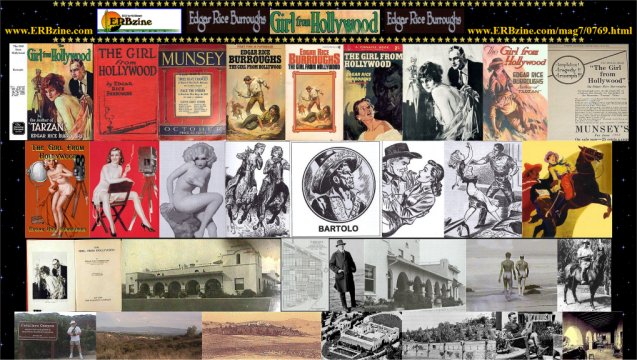
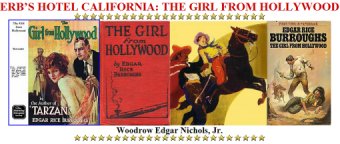
Read
The
Girl From Hollywood Text in ERBzine
See
the ERBzine Bibliography Entry
BACK TO EDGAR RICE
BURROUGHS' TARZANA RANCH 1921 - Docu/Novel
.
![]()
INTRODUCTORY AND CONTENTS PAGE
FOR
THE EDGAR RICE BURROUGHS ARTICLES
BY WOODROW EDGAR NICHOLS, JR.
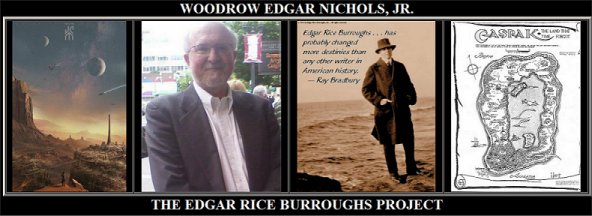
www.ERBzine.com/nichols
|
|
THE TRIMESTERS OF CASPAK |
|
by Woodrow Edgar Nichols, Jr. INTRODUCTION and CONTENTS |
![]()

![]()

BILL
HILLMAN
Visit
our thousands of other sites at:
BILL
AND SUE-ON HILLMAN ECLECTIC STUDIO
All
ERB Images© and Tarzan® are Copyright ERB, Inc.- All Rights Reserved.
All
Original Work © 1996-2014 by Bill Hillman and/or Contributing Authors/Owners
No
part of this web site may be reproduced without permission from the respective
owners.